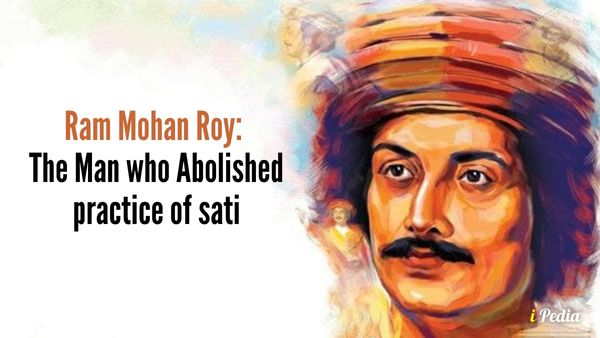The Brahmo Samaj was founded by Raja Ram Mohan Roy, a renowned scholar and free thinker. He was a social and religious reformer who is referred to as the “Father of Modern India” or the “Father of the Bengal Renaissance.”
Ram Mohan Roy, also known by the spellings Rammohun, Rammohan, or Ram Mohun, was an Indian religious, social, and educational reformer who challenged traditional Hindu culture and pointed the way for advancement in Indian society under British rule (born May 22, 1772, Radhanagar, Bengal, India—died September 27, 1833, Bristol, Gloucestershire, England). He has been referred to as the father of modern India.
He campaigned for rights for women, including the right for widows to remarry, and the right for women to hold property. His efforts led to the abolition of Sati in 1829 by Lord William Bentinck, the then Governor-General of India and opposed the practice of polygamy.
What does sati mean?
“Sati” originally meant a woman who performed the act of immolating herself after her husband’s death. The word is derived from the Sanskrit word “asti’, which means “She is pure or true”.
Why did Raja Ram Mohan Roy abolished Sati?
The abolition of Sati is one of the first things we are taught when learning about colonialism in India – about how Raja Ram Mohan Roy, a 19th century moderate leader from Bengal advocated against the cruel practice of the burning of the widow.
Key Information about Raja Ram Mohan Roy (1772–1833)
In a traditional Bengali Hindu family in Radhanagar, Hooghly District, Bengal Presidency in May 1772.
Ram Mohan received a higher education at Patna where he studied Persian and Arabic. He read the Qur’an, the Arabic translations of Plato and Aristotle’s works, as well as the poetry of Sufi mystics. Raja Rammohun Roy had acquired knowledge of Bangla, Persian, Arabic, and Sanskrit by the age of fifteen. He was fluent in Hindi and English.
- He travelled to Varanasi and immersed himself in the Vedas, Upanishads, and Hindu philosophy.
- He also studied Islam and Christianity.
- He wrote a logical critique of Hindu idol worship when he was sixteen years old.
- He worked for the East India Company’s Revenue Department from 1809 to 1814. He also served as Woodforde and Digby’s personal Diwan during that time.
- He began devoting his life to religious, social, and political reforms in 1814.
- Ram Mohan was described by Tagore as “a dazzling star in the firmament of Indian history” in his speech, “Inaugurator of the Modern Age in India.”
- As an emissary for the Mughal king Akbar Shah II (the father of Bahadur Shah), he travelled to England, where he succumbed to illness. In Bristol, England, in September 1833, he passed away.
- Akbar II, the Mughal Emperor of Delhi, bestowed upon him the title “Raja,” in response to his complaints.
Also Read – Who was Veerappan? A good man? An evil villain?



